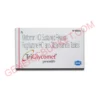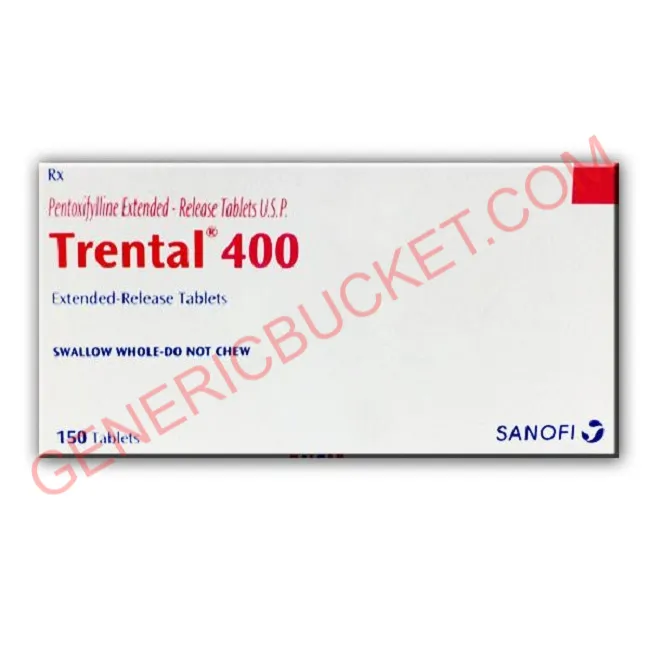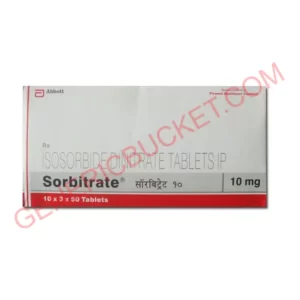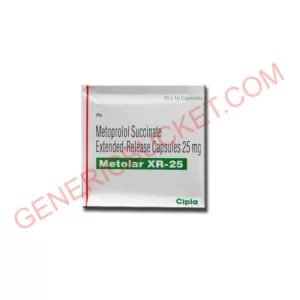Trental 400 Tablet (Pentoxifylline 400mg)
$23.00 – $57.00Price range: $23.00 through $57.00
| Country of Origin | india |
|---|---|
| Dosage Form | Tablets |
| Generic Name | Pentoxifylline |
| Indication | Peripheral vascular disease |
| Packaging | 15 tablets in a strip |
| Manufacturer | Sanofi India Ltd |
| Composition | Pentoxifylline (400mg) |
| Trental 400 Tablet (Pentoxifylline 400mg) | |||
| Pack Size | Price | Price/Unit | Add To Cart |
| 30 Tablet/s | $23.00 (0.77/unit) | $0.77 | |
| 60 Tablet/s | $42.00 (0.7/unit) | $0.7 | |
| 90 Tablet/s | $57.00 (0.63/unit) | $0.63 | |
INTRODUCTION
TRENTAL contains Pentoxifylline which belongs to the group of medicines called Peripheral vasodilators. It is used in the treatment of peripheral vascular disease (poor blood circulation to the arms and legs) and intermittent claudication (pain while walking or at rest due to poor circulation to the legs). Peripheral vascular disease (PVD) is a blood circulation disorder that causes the blood vessels outside of your heart and brain to narrow, block, or spasm and it occurs mostly in legs. Symptoms include leg weakness and numbness, painful cramp in hips, thighs or calf muscles after activities like walking or climbing stairs and cool skin around lower leg or foot.
Pentoxifylline works by decreasing the thickness (viscosity) of blood and allowing it to pass more easily through the blood vessels. This effect is useful in peripheral vascular disease, where the blood vessels in the arms and legs are narrowed.
TRENTAL is not recommended for use in patients who have heart problems or recently had a heart attack, severe palpitations (very fast and uneven heartbeats), stroke with bleeding in the brain (cerebral hemorrhage), and bleeding in the eye (retinal hemorrhage). Before taking TRENTAL inform your doctor if you are pregnant or breast-feeding. It is not recommended for use in children and adolescents (under 18 years of age) and it should be used with caution in elderly patients (aged 65 years and above). The most common side effects of taking TRENTAL are bloating, diarrhea, flushing, nausea, stomach discomfort, and vomiting. Contact your physician if any of the symptoms worsen.
USES OF TRENTAL
Treats:
- Peripheral vascular disease (poor circulation to the arms and legs)
- Intermittent claudication (pain while walking or at rest due to poor circulation to the legs)
HOW TRENTAL WORKS
TRENTAL works by decreasing the thickness (viscosity) of blood and allowing it to pass more easily through the blood vessels. This effect is useful in peripheral vascular disease, where the blood vessels in the arms and legs are narrowed.
DIRECTIONS FOR USE
Take TRENTAL as advised by your physician. Swallow the medicines with a glass of water. Do not crush or chew the medicine. Your physician will decide the correct dose and duration for you depending upon your age, body weight and disease condition.
SIDE EFFECTS OF TRENTAL
COMMON
- Nausea or vomiting
- Abdominal pain
- Bloating
- Diarrhoea
- Dizziness
- Headache
- Flushing
UNCOMMON
- Increased or decreased blood pressure
- Shortness of breath
RARE
Stop taking TRENTAL and contact your doctor immediately if you experience any of the following side effects:
- Allergic reaction (symptoms include rash, swallowing or breathing problems, swelling of your lips, face, throat, or tongue)
- Bleeding under the skin
- Blood in vomit or stools
- Aseptic meningitis (symptoms include headache, neck, stiffness, eye pain, or discomfort in bright light)
- Bruise more easily than usual (this may be due to low platelet count)
- Tachycardia (increased or fast heartbeat)
- Chest pain
- Palpitations (irregular heartbeat)
- Frequent infections such as severe chills, fever, sore throat, or mouth ulcers (signs of a blood problem called leukopenia)
- More infections than usual (caused by a decrease in the number of white blood cells (neutropenia)
HOW TO MANAGE SIDE EFFECTS
Nausea or vomiting:
Take this medicine with, or just after meals. Stick to simple meals. Avoid eating oil-rich or spicy foods. Contact your doctor if nausea and vomiting did not improve.
Diarrhoea:
Drink lot of fluids, such as water or fruit juices to keep you hydrated. Do not take any medicine on your own for treating diarrhea. Contact your doctor if your diarrhoea did not improve.
Stomach pain:
Try to take rest and relax. Eat and drink slowly or try to have smaller and frequent meals. Keep a heat pad on your stomach. If the symptom does not improve, contact your doctor.
Dizziness:
Try to rest and relax. Get enough sleep. Avoid driving or operate any machines while you are feeling dizzy. Do not drink alcohol, as it can aggravate your dizziness. Contact your doctor if your dizziness did not improve.
WARNING & PRECAUTIONS
PREGNANCY
TRENTAL is not recommended for use in pregnant women. Consult your doctor before taking TRENTAL.
BREASTFEEDING
TRENTAL should be used in breast-feeding women only if considered clearly necessary as it may pass through breast milk. Consult your doctor before taking TRENTAL.
DRIVING AND USING MACHINES
Do not drive or operate any machines if you feel dizzy after taking TRENTAL.
KIDNEY
TRENTAL should be used with caution in patients having kidney problems and your doctor may initiate the treatment with the lowest effective dose. Consult your doctor before taking TRENTAL.
LIVER
TRENTAL should be used with caution in patients having liver problems. Consult your doctor before taking TRENTAL.
ALLERGY
Do not take TRENTAL if you are allergic to pentoxifylline or other similar medicines such as theophylline or aminophylline, caffeine, or theobromine or any of the other ingredients of this medicine.
HEART DISEASE
TRENTAL is not recommended for use in patients having heart problems, severe palpitations or had heart attack recently. It should be used with caution in patients with hardening or narrowing of the arteries that supply blood to the heart. Consult your doctor before taking TRENTAL.
OTHERS
TRENTAL is not recommended for use if you:
- Had a stroke with bleeding in the brain (cerebral hemorrhage)
- Had eye bleeding (retinal hemorrhage)
Before taking TRENTAL, inform your doctor if you:
- Feel dizzy, light-headed, or faint when standing or sitting up too quickly (hypotension)
- Had surgery recently
- Have peptic ulcers
Use in pediatrics:
TRENTAL is generally not suitable for use in children and adolescents under 18 years of age. Contact child’s doctor for advice.
Use in geriatrics:
TRENTAL should be used with caution in elderly patients (aged 65 years and above). Usually, the treatment will be initiated with the lowest effective dose depending upon kidney function and your doctor may monitor your kidney function throughout treatment with TRENTAL. Consult your doctor before taking it.
INTERACTIONS
A. Drug-Drug interactions:
Before taking TRENTAL, inform your doctor if you are taking any of the following medicines:
- Medicines used to treat diabetes (Ex. metformin or insulin)
- Medicines used for high blood pressure (Ex. nifedipine, amlodipine, captopril)
- Medicines used to treat or prevent blood clots (Ex. warfarin)
- Medicines used to treat pain (Ex. ketorolac)
- Medicines used to treat wheezing or difficulty in breathing (Ex. theophylline)
- Medicines used to treat bacterial infections (Ex. ciprofloxacin)
- Medicines used to treat heartburn and stomach ulcers (Ex. cimetidine)
Overdosage:
If you or anyone else accidentally take too much of TRENTAL, consult your doctor immediately or visit the nearby hospital. The symptoms of overdosage are low blood pressure, feeling sleepy, fits (seizures), or uneven heartbeat.
Related products
Antibiotics
Allergy
New Products
Antibiotics
Angina Pectoris Anti-Anginals
Heart & Blood Pressure
Antibiotics
Angina Pectoris Anti-Anginals







